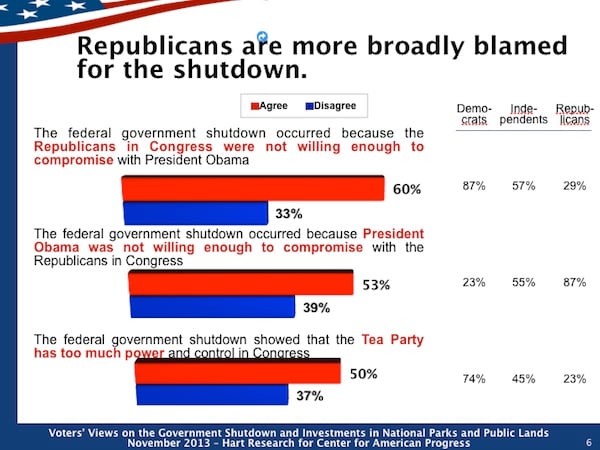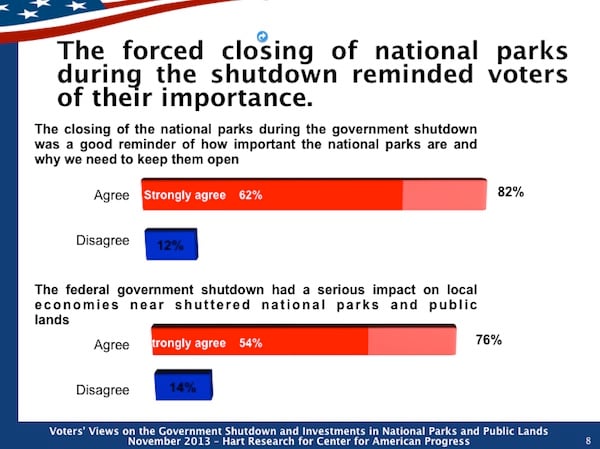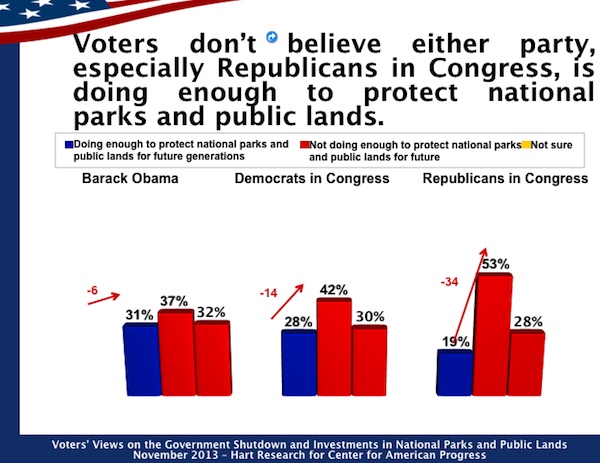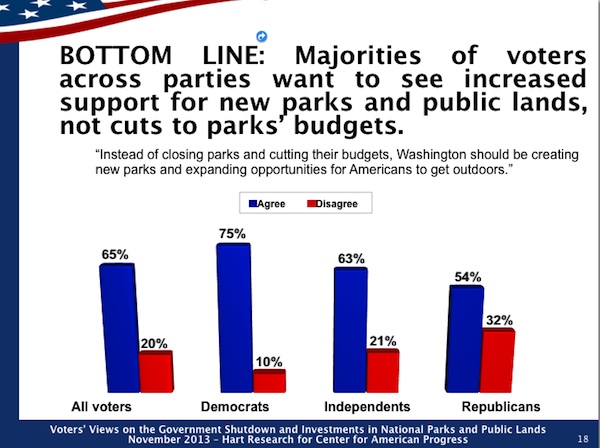Congress, not the Obama Administration, must shoulder the blame for the 16-day closure of the National Park System last month, according to a recent survey of voters.
Beyond that, the polling showed Americans love their national parks and don't want to see them impacted further by budget cuts.
“I think the main points that I take away from all of this is that the closing of the parks and other public lands during the government shutdown was a teachable moment for Americans," Geoff Garin, president of Hart Research Associates, said during a conference call Friday to discuss the polling results.
"And it was a moment when Americans were reminded about the importance of the parks and the other public lands to the country and also about the economic importance of parks and public lands to the communities where they live."
The strength of the poll, he offered, was that while there were some partisan differences on some questions, overall there was bipartisan support among voters for the national parks. Of the 1,005 registered voters surveyed, 38 percent described themselves as either mostly Democrats or leaning Democratic, while 32 percent said they were either mostly Republican or leaning Republican. Twenty-six percent identified themselves as Independents.

The poll, taken Oct. 31-Nov 4 for the Center of American Progress, portrays Republicans in Congress as largely uncaring for national parks and public lands in general. Just 19 percent of those surveyed said Republicans were doing a good job protecting national parks and public lands for future generations, with 53 percent voicing the opinion that they weren't.
While President Barack Obama received better marks on parks and public lands, they still were weak, with just 31 percent of those surveyed saying the president was doing enough to protect national parks and public lands and 37 percent saying he wasn't doing enough.
Democrats in Congress fell in between the GOP and the president, with just 28 percent saying they were doing enough for parks and public lands vs. 42 percent who weren't impressed with Democrats' actions.
The poll, which also contained questions on oil and gas drilling on public lands, provides a portrait of public opinion on how the public domain should be managed.
One interesting aspect of that portrait is that a rather strong majority, 60 percent, of Americans don't know a lot about public lands and the issues that swirl about them. While 8 percent of the respondents said they knew a "great deal" about public lands, and 31 percent said they knew "a fair amount," another 27 percent said they knew "just some" about the public empire and its management, 26 percent said they knew very little, and 7 percent claimed to know nothing at all about the public landscape and its issues.
Perhaps that should not come as a surprise, as the U.S. Bureau of Land Management manages the largest swath of public lands, and those are in the wide-open West, away from the more populous Eastern seaboard and West Coast. "National parks," though, range from coast to coast, carry a strong cachet, and evoke thoughts of beautiful landscapes populated with wild animals, gushing streams, thick forests, and clean air.

While only a slight majority, 52 percent, said it was "a very or pretty big problem" that the National Park System by and large was shuttered for 16 days in October do to Congress' failure to resolve the country's fiscal affairs, 82 percent were of the opinion that "the closing of national parks during the government shutdown was a good reminder of how important the national parks are and why we need to keep them open," noted the pollsters.
Mr. Garin, when asked if it was significant that the polling showed that 48 percent of those surveyed didn't see a problem with the park system's closure, replied that that wasn't necessarily a big deal.
"To me, what I find more surprising is not that 48 percent said it's not a big deal, it’s that 52 percent did say it’s a big deal," he stressed. "Reality is is that by the time we asked this, the shutdown was over, the parks were reopened, everybody had access to them."
And yet despite the relatively short duration of the shutdown, a majority of Americans nevertheless considered it a big deal even two weeks after the parks had reopened, the pollster noted.
"Beyond that ... it’s not that people had that feeling of this is a bad thing, but it’s really the takeaway. What did people learn about the parks in this teachable moment," Mr. Garin said. "And the important part is not about what happened in that instance, but that the closing of the national parks during the government shutdown was a good reminder of how important the national parks are and why we need to keep them open.”
What really stood out, he said, was the bipartisan support for the national parks.
"Even for the sake of the budget deficit, Republicans and other voters say that we should not be letting this next round of sequester cuts go into effect. Republicans say that by a margin of 2-1, 62-31," said Mr. Garin.

Fifty-five percent of the respondents said that the $153 million in cuts absorbed by the National Park Service earlier this year when the budget sequestration kicked in went too far, while only 22 percent the cut was "about right," the pollster said.
And yet, according to the polling, just 39 percent said Park Service funding should be restored to levels prior to the sequestration, while 46 percent said it should be maintained at current levels. With another round of sequestration cuts scheduled to take hold in January, 74 percent of those polled (82 percent of Democrats, 75 percent of Independents, ad 64 percent of Republicans) expressed the belief that the national parks should be off-limits for them, he said.
"There is no clamoring in the country at all for additional budget cuts for the national parks. And indeed, it is a majority of Americans who feel that we’ve already gone too far in cutting funding for the parks," said Mr. Garin. "I would just note here, that even among Republican voters, who are the most fiscally conservative, they are evenly divided on this question. As many Republicans have said they’ve gone too far as say that they haven’t gone far enough, or that they should go further.
“I would dare say there are very few categories of government spending of which this would be true for Republicans. And funding for national parks and public lands really stand out in this regard.”

While one reporter questioned whether the results shouldn't be surprising considering the value placed on national parks, that the outcome would be the same if they were asked whether they were "in favor of killing kittens," Mr. Garin said the lack of surprise in the polling results was exactly the point.
"Parks and other public lands really are honored and a special function of government. To use your kitten analogy, they don’t want to kill the kitten when we’re going through the sequester cuts. That’s what the reality is," he said.
At the Coalition of National Park Service Retirees, Chair Maureen Finnerty said the strong support for the national parks should come as no surprise.
"The Hart Research Associates survey underscores what the Coalition of National Park Service Retirees knows from first-hand experience. Americans love their national parks and want them to be open and adequately funded," she said in a prepared statement.
"Furthermore, Americans are sick and tired of those in Congress who use national parks and National Park Service employees as pawns in partisan budget showmanship games.”
Among the poll's findings:
* Sixty-five percent of those polled (75 percent of Democratic respondents, 63 percent of Independents and 54 percent of Republicans) said that instead of cutting the National Park Service budget, "Washington should be creating new parks and expanding opportunities for Americans to get outdoors."
* In the area of national parks in particular, and public lands in general, the poll results pointed to a rather strong (58 percent) belief that the government should focus more on conserving and protecting public lands (58 percent), than on permitting drilling on those lands (22 percent).
* As for the politics behind the parks' closure, 60 percent agreed with the statement that "the federal shutdown occurred because Republicans in Congress were not willing enough to compromise with President Obama," while 53 percent said it was the president's fault for not being willing to compromise.
As for any possible Tea Party influence on the government shutdown, those polled broke 50-50 on the question of whether the shutdown "showed that the Tea Party has too much power and control in Congress."
The survey did not ask whether Senate Democrats were at fault for not taking up House proposals to fund the Park Service during the shutdown.
* The survey also showed that a strong majority (76 percent) believed the shutdown had a "serious impact on local economies" of gateway communities, while 65 percent were of the opinion that "instead of closing parks and cutting their budgets, Washington should be creating new parks and expanding opportunities for Americans to get outdoors."

 Support Essential Coverage of Essential Places
Support Essential Coverage of Essential Places







Comments
"Furthermore, Americans are sick and tired of those in Congress who use national parks and National Park Service employees as pawns in partisan budget showmanship games.” Which translates to sick and tired of playing politics.
'53 percent said it was the president's fault for not being willing to compromise." Both sides are at fault, however the president does seem to be inflexible on some issues and he must have thought closing the parks and monuments would bolster his position.
My initial exposure to statistics in 1970 was a basic course at Humboldt State.... The mandatory textbook was "How to lie with Statistics". I see that little has changed.
Center for American Progress? Riiight!
Interesting to see CAP use this in connection with the launch of their new public lands project, and whether that will have any meaningful result.
It does show solid bipartisan support for the parks, unsurprisingly.
However, you also put me down as skeptical as to the veracity of the poll's political findings. And it's pretty pointless to ask the American public about the effects of sequestration when a vast majority have no concept of our budgetary situation or what it entails. Citizens also regularly insist that we cut federal spending, but reject doing so to any area of consequence. There's rarely any recognition that trade-offs always have to be made.
I don't know why they are surveying people about closing National Parks when no one is seriously talking about closing any of the National Parks. There are however some very credible calls to trim back a few pork barrel parks --National Historic Sites and a few small National Monuments -NO NATIONAL PARKS! The NPS opposed the creation of many of these sites in the first place.
If the public were polled about the wisdom of funding things like New Orleans Jazz NHS or the Wolf Trap Entertainment Complex I think the Centers for American Progress would get a very different and a more accurate picture of what the pubic wants. But the Centers for American Progress would not want that because they are a far left extremist organization who thinks government should be involved in all aspects of life and that government can never be large enough. For the Coalition of Retired NPS Employees to site a study conducted by that group causes one to suspect that they may be the same.
NPS leadership has made a conscious decision to refer to all 400 units of the system as National Parks so that when anyone starts talking about maybe transferring one to state control or into a private trust they can cry out that National Parks are being closed.
If I am wrong would would anyone from the CNPSR care to reply to this comment by naming just one of the 401 that they think we can do without? Surely there must be at least one among a number that large. What if we could enact some guarantee that all of the funding of any units closed would go toward those that remain. Who couldn't like that?
Put me down in the group that finds this information credible.
I say this not only as someone currently on the progressive spectrum, but as someone who spent years as a conservative activist who came to realize that I had to develop a conscience, and hence the start of the evolution away from conservative Republican activism.
Perp seasonal--Put me down as one who wouldn't like that. Each generation of Americans gets to add to the National Park System those areas they believe are important, either to our natural or cultural heritage. Remember, the vast majority of areas were added to the System through the people speaking through their Congressional representatives. They thought these places merited protection in perpetuity. I would hate to think of some of the areas added during by my generation--Guadalupe NP, Golden Gate NRA, the Alaskan parks etc. would be deauthorized by some future generation. I have always thought of it as a matter of generational equity. We owe it to our predecessors to provide the highest standard of care we can to these sites. We can't be careless with this legacy.
Rick
I am especially grateful for NPT because it made me aware of the Ranger Danno, Indian Trader and other "dirty little secrets" the NPS would soon get swept under the rug. It was the Smokies backcountry controversy that ignited my awareness of the NPS and their underhanded methods. It was this magazine that really opened my eyes with unbiased reporting. For instance, when I read about a Ranger getting abused for reporting abuse within the agency regarding tree cutting for a wealthy person, I was amazed at the similarities in the Smokies where a former governor was allowed to have trails re routed from his land adjoining the park. Then I found out, through the fee controversy and eye opening reporting of this magazine, that a current TN senator has interests in a private resort that receives all sort of favoritism from the NPS to the exclusion of regular park users. This private resort has their own trail system WITHIN the National Park that is off limits to us peons. Just so happens that the guy who runs this private resort is the son of aforementioned senator.
So to see the NPS exposed for their bureacratic cronyism is a delight to me. And for that I should probably be thanking the Jon Jarvis, Dale Ditmanson types. They have opened the eyes of many in these parts to the corruption of this system.
Would be interested to know who this Senator is. Please share.